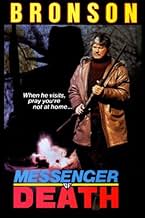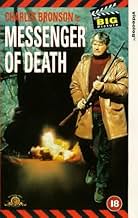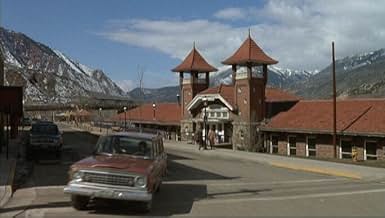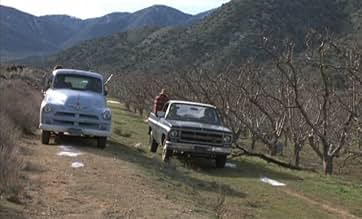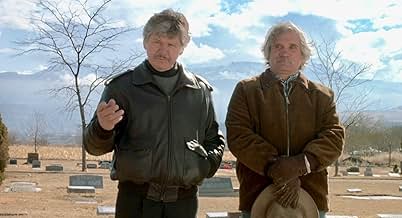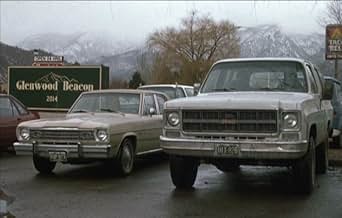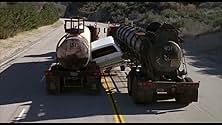IMDb RATING
5.4/10
3.7K
YOUR RATING
A Denver reporter investigates the mass murder of a family of Mormons in rural Colorado.A Denver reporter investigates the mass murder of a family of Mormons in rural Colorado.A Denver reporter investigates the mass murder of a family of Mormons in rural Colorado.
- Director
- Writers
- Stars
- Director
- Writers
- All cast & crew
- Production, box office & more at IMDbPro
Featured reviews
Charles Bronson plays investigative reporter Garret Smith for the Denver Tribune in this motion picture about a blood feud between two brothers, of different Mormon sects. With outside political as well as economic overtones.
A decent story about religious jealousy and the behind the scenes politics of exploiting it. The feud between brothers Willis, Jeff Corey, and Zenas, John Ireland, Beecham is instigated when Willis' son's Orville's, Charles Dierkop, family is massacred. Willis believes that it was the work of Zenas and starts an all out war against his brother which ends with both brothers getting killed. But there's something else that has nothing to do with the feud between the brother's that's central to the story: A lake of artesian water under brother's Zenas' property that can be used to turn common and plentiful shale into valuable and scarce fuel oil.
Charles Bronson is still believable, at age 67, as the tough reporter that gets to the bottom of the story with his fists as well as his typewriter to uncover the truth about Orville's family being murdered. As well as who ordered it that instigated a war between his father and uncle and why.
With the exception of the beginning the movie "Messenger of Death" cuts down on the violence and concentrated more on the story which made the movie more interesting to watch. And also gave the audience more time to think who's behind the murders that happened to the Orville Beecham family which built up to a better then average ending.
The ending of "Messenger of Death" though a bit contrived and what seemed forced still tied the story together and made it believable. One of Charles Bronson's best later efforts when he was still effective as an action hero, or in this case an action reporter, on the screen.
A decent story about religious jealousy and the behind the scenes politics of exploiting it. The feud between brothers Willis, Jeff Corey, and Zenas, John Ireland, Beecham is instigated when Willis' son's Orville's, Charles Dierkop, family is massacred. Willis believes that it was the work of Zenas and starts an all out war against his brother which ends with both brothers getting killed. But there's something else that has nothing to do with the feud between the brother's that's central to the story: A lake of artesian water under brother's Zenas' property that can be used to turn common and plentiful shale into valuable and scarce fuel oil.
Charles Bronson is still believable, at age 67, as the tough reporter that gets to the bottom of the story with his fists as well as his typewriter to uncover the truth about Orville's family being murdered. As well as who ordered it that instigated a war between his father and uncle and why.
With the exception of the beginning the movie "Messenger of Death" cuts down on the violence and concentrated more on the story which made the movie more interesting to watch. And also gave the audience more time to think who's behind the murders that happened to the Orville Beecham family which built up to a better then average ending.
The ending of "Messenger of Death" though a bit contrived and what seemed forced still tied the story together and made it believable. One of Charles Bronson's best later efforts when he was still effective as an action hero, or in this case an action reporter, on the screen.
The film has Charles Bronson in its favor, and is fairly well-made. It'a a little unbelievable, but fans of the genre or Bronson should enjoy it. Basically, Charles Bronson is an investigative reporter who investigates the slaying of a man's family, originally under the impression that the slaying was due to religious differences. One thing of minor note...it's not really a feud between different Mormon sects. The LDS Church has banned polygamy, in accordance with federal law, and excommunicates members who practice it. I suppose some might say that all the break-off groups(like the RLDS, FLDS and polygamist clans) can be considered part of a Mormon Religious Umbrella....but that would be kind of like saying members of the Russian Orthodox Church are really Catholic.
Boy, this is a mess. This is one of those films that, on paper, look like they have a lot going for them but, when they put it on the screen, nothing meshes. There's a decent cast Bronson, van Devere, Benzali, Ireland, Corey and an intriguing setting, but the plot is fatally anaemic and the direction, considering it comes from an old trooper like Thompson, is surprisingly shoddy. Much of the acting is second-rate at best, while characters perform abrupt about turns for no explicable reason. For instance, Orville Beecham (Charles Dierkop), a clean-living Mormon farmer, is crazy for revenge after mysterious intruders murder his wives and children and yet is full of forgiveness after the rest of his family is wiped out in a gunfight.
The film opens well, with an atmospheric prologue in which two mysterious gunmen massacre the wives and children, although why the gunmen's identities are concealed is something of a mystery as they disappear for the next thirty minutes and are immediately confirmed as the killers when they re-appear. Anyway, from this neatly paced opener, the film goes rapidly downhill. Charles Bronson plays a Denver reporter who gets involved with the warring Mormon clans who go to war over the killings, and he's pretty bad here. He was 67 when the film was made, and he looks bloated and tired. On top of that, he's saddled with an awful script and a frankly ludicrous storyline which is a crime really because the unusual subject matter here deserves much better writing than that offered by 73-year-old writer Paul Jarrico. Director J. Lee Thompson manages a couple of effective scenes, and there is a good sequence in which two water tankers attempt to crush Bronson's vehicle on a winding country road, but for the most part his direction is flat and uninspired and the story simply fails to engage.
Bottom line: give this one a miss.
The film opens well, with an atmospheric prologue in which two mysterious gunmen massacre the wives and children, although why the gunmen's identities are concealed is something of a mystery as they disappear for the next thirty minutes and are immediately confirmed as the killers when they re-appear. Anyway, from this neatly paced opener, the film goes rapidly downhill. Charles Bronson plays a Denver reporter who gets involved with the warring Mormon clans who go to war over the killings, and he's pretty bad here. He was 67 when the film was made, and he looks bloated and tired. On top of that, he's saddled with an awful script and a frankly ludicrous storyline which is a crime really because the unusual subject matter here deserves much better writing than that offered by 73-year-old writer Paul Jarrico. Director J. Lee Thompson manages a couple of effective scenes, and there is a good sequence in which two water tankers attempt to crush Bronson's vehicle on a winding country road, but for the most part his direction is flat and uninspired and the story simply fails to engage.
Bottom line: give this one a miss.
A movie where Charles Bronson doesn't kill anyone. Despite the title. Despite the poster or the video cover. There are indeed deaths, in a Mormon family, where children and women are massacred (this is the beginning of the film). Charles Bronson is a journalist who investigates to understand why a family of Mormons has been decimated. He conducts the investigation on his own, at his own pace, independently of the police, supported by his newspaper, which wants to create a sensation.
The documentary side of the film presents us with the thought patterns of these Mormons, where God's will (which explains everything) and vengeance go hand in hand, in a country where guns are freely available. The messenger of death is the killer who decimated the family, unrelated to the character of Charles Bronson who investigates. Or, the journalist through his investigation, who will indirectly provoke reprisals between Mormon families.
Another interesting element of the film is the natural settings of Colorado. Let's add a superb music that can make us think of a horror movie: the composer, Robert O. Ragland is unknown to us, but has signed many film scores. This one is interesting, because it suits the suspense and horror.
The film ends with evil capitalists and politicians greedy for money.
The film can be watched without any problem. The scenes in the city (Denver, the capitalists, the important people) are the perfect counterpoint to the scenes in the countryside where Charles Bronson investigates and ends up putting the pieces of the puzzle together in the Mormon farms.
The documentary side of the film presents us with the thought patterns of these Mormons, where God's will (which explains everything) and vengeance go hand in hand, in a country where guns are freely available. The messenger of death is the killer who decimated the family, unrelated to the character of Charles Bronson who investigates. Or, the journalist through his investigation, who will indirectly provoke reprisals between Mormon families.
Another interesting element of the film is the natural settings of Colorado. Let's add a superb music that can make us think of a horror movie: the composer, Robert O. Ragland is unknown to us, but has signed many film scores. This one is interesting, because it suits the suspense and horror.
The film ends with evil capitalists and politicians greedy for money.
The film can be watched without any problem. The scenes in the city (Denver, the capitalists, the important people) are the perfect counterpoint to the scenes in the countryside where Charles Bronson investigates and ends up putting the pieces of the puzzle together in the Mormon farms.
One of the things that bugs me most about the later Charles Bronson-movies is that so many of them flaunt a terrible supporting cast. Don't get me wrong, it's great to see Stephen Elliott ham it up as Bronson's boss in "Assassination" or Juan Fernandez as a creepy pimp in "Kinjite: Forbidden Subjects" but aside from one or two OK performances good old Charlie was too often surrounded by grade-C actors or good but uninspired actors, the last two decades of his career.
"Messenger of Death" however, is an exception.
Here the legendary action-hero is surrounded by the likes of Jeff Corey, Daniel Benzali, John Ireland, Charles Dierkop (Police Woman) and given likeable female support from Trish Van Devere. The story itself is just average, but certainly not as ludicrous as the paper-thin material in movies like "Assassination" and "Death Wish 4" and "5" and you know where I'm going.
British veteran director J. Lee-Thompson (Cape Fear, The Guns of Navarone) did an impressive nine movies with Bronson, and "Messenger of Death" was their 8th teaming. It opens with a horrifying scene where a large family is executed in cold blood (the entire scene is brilliantly done and much better than what one would expect from someone who just did "Death Wish 4" and "Firewalker"). The movie then delivers a lot of beautiful scenery, a smashing action-scene with some trucks and a likeable finale where the guilty party is unmasked.
Compared to most Bronson-fare at the time this is better-than-average, much thanks to the afore mentioned good supporting cast. But don't expect mindless vigilante action, Bronson plays a reporter but he still gets to kick some ass, and he does a nice job considering he was in his late sixties at the time.
"Messenger of Death" however, is an exception.
Here the legendary action-hero is surrounded by the likes of Jeff Corey, Daniel Benzali, John Ireland, Charles Dierkop (Police Woman) and given likeable female support from Trish Van Devere. The story itself is just average, but certainly not as ludicrous as the paper-thin material in movies like "Assassination" and "Death Wish 4" and "5" and you know where I'm going.
British veteran director J. Lee-Thompson (Cape Fear, The Guns of Navarone) did an impressive nine movies with Bronson, and "Messenger of Death" was their 8th teaming. It opens with a horrifying scene where a large family is executed in cold blood (the entire scene is brilliantly done and much better than what one would expect from someone who just did "Death Wish 4" and "Firewalker"). The movie then delivers a lot of beautiful scenery, a smashing action-scene with some trucks and a likeable finale where the guilty party is unmasked.
Compared to most Bronson-fare at the time this is better-than-average, much thanks to the afore mentioned good supporting cast. But don't expect mindless vigilante action, Bronson plays a reporter but he still gets to kick some ass, and he does a nice job considering he was in his late sixties at the time.
Did you know
- TriviaDirector J. Lee Thompson fell ill during the making of this film, the picture was finished by second unit director, Robert C. Ortwin Jr..
- GoofsDuring the car chase, Smith's car is on the inside of one of the tankers on the first corner out of the tunnel, but in the next shot it's back in the middle of both tankers.
- Quotes
Garret Smith: [punching the assassin] Bastard child killer!
- Alternate versionsAlmost 5 minutes were cut in Finland for VHS distribution. Later released on DVD as uncut.
- ConnectionsReferenced in DVD/Lazerdisc/VHS collection 2016 (2016)
- How long is Messenger of Death?Powered by Alexa
Details
Box office
- Gross US & Canada
- $3,074,681
- Opening weekend US & Canada
- $1,035,279
- Sep 18, 1988
- Gross worldwide
- $3,074,681
- Runtime
- 1h 31m(91 min)
- Color
- Sound mix
- Aspect ratio
- 1.85 : 1
Contribute to this page
Suggest an edit or add missing content


